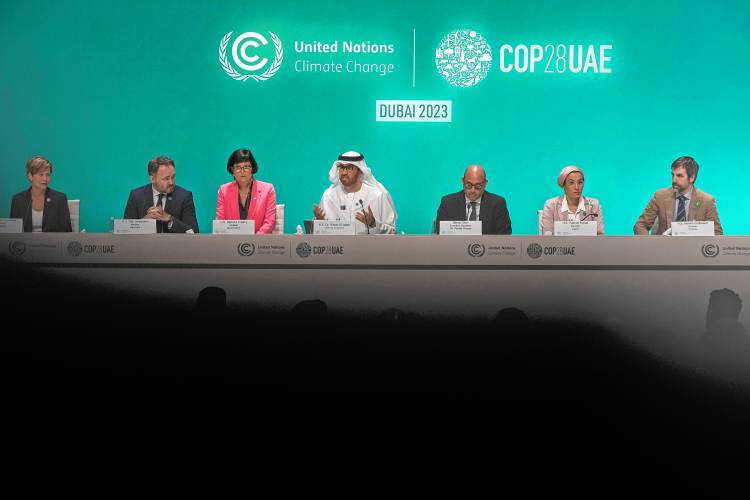Guest columnist Helen Seidler: Energy transition is going to take a push from everybody

COP28 President Sultan al-Jaber, center, speaks during a news conference at the COP28 U.N. Climate Summit, Friday, Dec. 8, 2023, in Dubai, United Arab Emirates. AP FILE PHOTO/PETER DEJONG
| Published: 04-04-2024 4:01 PM |
In his regular column last month, Russ Vernon-Jones argued that the climate crisis affects all of humanity and that wealthier countries need to finance the use of renewable energy in poorer countries to support their development [“Solving humanity’s shared climate crisis,” March 15]. In response, guest columnist Daniel Lyons pointed out that current energy production on which modern economies rely is complex and not subject to change in the short term [“World’s energy systems will not change in the short term,” March 30].
Let’s continue the discussion.
These writers’ assertions are not in conflict with each other. The point of contention is whether there are reliable pathways for significant money to be invested in effective green energy infrastructure in poorer countries in a time frame that avoids a global climate disaster. Here are some options for such investment.
The U.N. Climate Summit held in December established a “loss and damage” fund to assist poorer nations coping with increasing environmental devastation from changes in historically normal weather patterns. In addition, over the past decade, governments have been seriously negotiating how to enable “climate-smart finance” for development.
On the agenda are tools such as trade-related carbon border adjustments and the use of multinational development banks to encourage projects such as building low-emissions energy supplies. These initiatives are targeting not only government funding but significant private investments as well. Investors and businesses need to pay attention, have a clear-eyed view of what is at stake, and get in the game.
What is at stake are the foundations of our current world order. For the past 30 years, scientists from many disciplines have been signaling with increasing fervor that our life support systems are fragile, given the rapid rise in air, land, and sea temperatures resulting from burning fossil fuels. Potential losses include global food security, temperatures in the zone of human tolerance, fresh water access, and manageable cycles of drought and flood. Business as usual would not be an option, and people would be on the move.
As important as it is, financing green energy infrastructure, whether at home or abroad, is not a complete solution. Shifting away from fossil fuels is a long-term, economy-wide project that is already underway but needs a major push forward from businesses, communities, schools, organizations, and individuals. In other words, a push from everyone, everywhere, now.
Article continues after...
Yesterday's Most Read Articles
 A rocky ride on Easthampton’s Union Street: Businesses struggling with overhaul look forward to end result
A rocky ride on Easthampton’s Union Street: Businesses struggling with overhaul look forward to end result
 Northampton school budget: Tensions high awaiting mayor’s move
Northampton school budget: Tensions high awaiting mayor’s move
 Northampton man held without bail in December shooting
Northampton man held without bail in December shooting
 Hadley eyes smart growth zoning district
Hadley eyes smart growth zoning district
 ‘None of us deserved this’: Community members arrested at UMass Gaza protest critical of crackdown
‘None of us deserved this’: Community members arrested at UMass Gaza protest critical of crackdown
 Extreme weather forces valley farmers to adapt
Extreme weather forces valley farmers to adapt
Imagine if we were to examine each important decision we make with a climate lens. Would our action be neutral, friendly, or harmful from a climate perspective? Would our action have positive, negative, or no impact on people most vulnerable to climate extremes?
This is not a call for austerity; rather it is a call for an awareness that what we do matters. Just as the current administrations at the federal level and the Massachusetts state level have adopted a “whole of government” approach to work toward established climate goals, we can adopt a “whole of society” approach to bring about the transition needed to protect the ecosystems of our precious planet.
After all, it is the only home for today’s young people and future generations.
Helen Seidler of Northampton is a member of the Pioneer Valley chapter of Citizens’ Climate Lobby.

 Columnist John Sheirer: Eclipse eclipsed expectations
Columnist John Sheirer: Eclipse eclipsed expectations Guest columnist Gwen Agna: Why I voted for school board budget
Guest columnist Gwen Agna: Why I voted for school board budget My Turn: Quabbin region will never see any bounty
My Turn: Quabbin region will never see any bounty Frank Higbie: Don’t cancel student debt
Frank Higbie: Don’t cancel student debt
